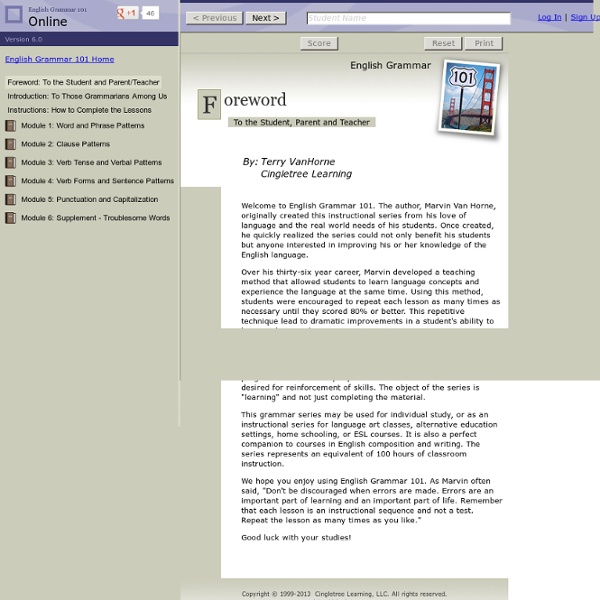English Grammar Revolution: Grammar Made Easy
Flashcards about FACS
incorrect cards (0) correct cards (0) remaining cards (44) Save retry fix restart shuffle help To flip the current card, click it or press the Spacebar key. retry the cards in the incorrect box restart all cards Embed Code - If you would like this activity on your web page, copy the script below and paste it into your web page.
Task-based grammar teaching
By Lindsay Clandfield Lindsay Clandfield discusses task-based grammar teaching and provides a lesson plan based on this methodology which teaches the grammar point used to. Introduction One approach to teaching language that has attracted a lot of attention over the past 25 years is a task-based approach to learning and teaching. In task-based approaches, the focus of classroom activities is on the task, and ultimately on meaning (for more on task-based teaching and learning, see the Methodology section). In Jane Willis’ flexible model for task-based learning, learners begin by carrying out a communicative task, without specific focus on form. The advantage of the task-based approach, according to its advocates, is that during the task the learners are allowed to use whatever language they want, freeing them to focus entirely on the meaning of their message. One danger of task-based approaches is that focus on meaning could come at the expense of focus on form. Preparation Pre-task warmer
Flashcards: The world's largest online library of printable flash cards
Past Perfect
Copyright 2002-2010 Past-Simple.com. All rights reserved {*style:<b> Present Progressive | Present Perfect | Future Simple | Present Simple | Past Perfect | Past Simple | Verb Tenses | </b>*}{*style:<b> ESL | Future Perfect Progressive | Past Perfect Progressive | Past Progressive | Future Perfect | Present Perfect Progressive Language Exchange | quiz | exercises | ESOL | EFL | English grammar | english course | English activities | English exercises | Grammar Topic </b>*} {*style:<b> past simple past simple question forms past simple exercise past simple and continuous past simple and past continuous past simple and present perfect , past simple exercises past simple quiz past simple tense past simple esl English English grammar English as a Second Language , esl learn English non-continuous verb noncontinuous verb non-progressive verb nonprogressive verb passive verb Past Simple verb form present simple , present simple exercise present simple and
InnovatiVocab - home
Grammar Bytes! Grammar Instruction with Attitude
Grammar Instruction with Attitude Home • Terms • Exercises • MOOC • Handouts • Presentations • Videos • Rules • About • Shop • Feedback ©1997 - 2019 by Robin L. valid html
Find, share & upload documents.
Daily Grammar Archive - Comprehensive Archive of Grammar Lessons
This archive contains links to all of our free grammar lessons and quizzes. You can use this archive to study Daily Grammar at your own pace. Lessons 1-90 cover the eight parts of speech, which are verbs, nouns, pronouns, adjectives, adverbs, prepositions, conjunctions, and interjections. Lessons 91-300 cover the parts of the sentence, such as appositives, predicate nominatives, direct objects, prepositional phrases, clauses, and verbals. Lessons 301-440 cover the mechanics of grammar, which is also known as capitalization and punctuation. Our lessons have been organized by lesson number and by subject. Lessons 1, 2, 3, 4, 5 - Quiz Lessons 6, 7, 8, 9, 10 - Quiz Lessons 11, 12, 13, 14, 15 - Quiz Lessons 31, 32, 33, 34, 35 - Quiz Lessons 36, 37, 38, 39, 40 - Quiz Lessons 41, 42, 43, 44, 45 - Quiz Lessons 46, 47, 48, 49, 50 - Quiz Lessons 51, 52, 53, 54, 55 - Quiz Lessons 56, 57, 58, 59, 60 - Quiz Lessons 61, 62, 63, 64, 65 - Quiz Lessons 66, 67, 68, 69, 70 - Quiz
English Language Centre Study Zone: Welcome!
About the Study Zone The Study Zone is for students of the English Language Centre (ELC) at the University of Victoria. ELC teachers create the English language lessons and practice exercises. The site is designed for our adult English language learners, but all are welcome to read the lessons and use the exercises. News and Feedback We occasionally post news on the Study Zone blog and we're happy to receive comments on the blog's Feedback Page. Who visits Study Zone? This map shows the visitors to this page only. What do I do? First, choose your level. Study Zone is made up of levels. Where am I now? The menu at the top of each page tells you where you are.




This site is for people learning English. It allows for repetition and encourages the student until they pass with an 80% or better. by cgarcia224 Nov 6